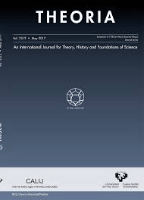
THEORIA-REVISTA DE TEORIA HISTORIA Y FUNDAMENTOS DE LA CIENCIA
metrics 2024
Bridging Philosophy and History in Science
Introduction
THEORIA-REVISTA DE TEORIA HISTORIA Y FUNDAMENTOS DE LA CIENCIA, published by the Servicio Editorial Universidad del País Vasco, is a leading open access journal dedicated to advancing the fields of History, Philosophy of Science, and related disciplines since its inception in 2003. With a robust impact factor placing it in the esteemed Q1 and Q2 quartiles in its respective categories, this journal serves as a crucial platform for researchers, professionals, and students who are engaged in profound discussions and analyses of scientific foundations and historical contexts. Based in Spain, THEORIA has consistently demonstrated its commitment to scholarly excellence, achieving notable rankings in Scopus, particularly in the fields of Arts and Humanities, where it holds a rank of #169 in Philosophy and #59 in History and Philosophy of Science. The journal not only allows immediate open access to its diverse range of articles, fostering global knowledge dissemination, but also aims to bridge connections across varied philosophical inquiries and historical explorations within science. Join the dialogue today in shaping the future understanding of our scientific heritage.
Metrics 2024
 0.33
0.33 0.80
0.80 0.60
0.60 17
17Metrics History
Rank 2024
Scopus
IF (Web Of Science)
JCI (Web Of Science)
Quartile History
Similar Journals
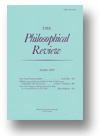
PHILOSOPHICAL REVIEW
Pioneering Insights in PhilosophyPHILOSOPHICAL REVIEW, published by DUKE UNIVERSITY PRESS, is a leading academic journal in the field of philosophy, recognized for its rigorous scholarship and impactful contributions to theoretical and applied philosophy. With an impressive Q1 ranking in the 2023 Scopus metrics, it places within the top percentile of philosophical journals, affirming its significance in the discourse. The journal, which has a rich publication history since its inception in 1970, focuses on a diverse range of philosophical topics, catering to a broad audience of researchers, practitioners, and scholars. Although it doesn't offer Open Access options, its articles remain highly sought after for their depth and quality. With a dedicated readership and a commitment to exploring fundamental philosophical questions, PHILOSOPHICAL REVIEW continues to shape contemporary philosophical thought and engage with pressing issues in various domains.

Spontaneous Generations-Journal for the History and Philosophy of Science
Fostering Dialogue on the Evolution of Scientific IdeasSpontaneous Generations: Journal for the History and Philosophy of Science is a dedicated publication focusing on the rich fields of history and philosophy within the scientific domain. Published by the Institute for the History and Philosophy of Science and Technology, this journal provides a vital platform for scholars, researchers, and students to explore and disseminate ideas that bridge the historical context and philosophical inquiries of scientific practices. With its commitment to open access, Spontaneous Generations ensures that groundbreaking research is widely available, fostering an environment of collaboration and knowledge sharing. Aiming to engage a diverse audience, this journal is pivotal for those looking to understand the evolution of scientific thought and its implications on contemporary issues, making it an essential resource in the academic community.

HISTORY AND PHILOSOPHY OF THE LIFE SCIENCES
Unraveling the Threads of Life Sciences Through Time and ThoughtHISTORY AND PHILOSOPHY OF THE LIFE SCIENCES, published by SPRINGER INT PUBL AG, stands as a leading peer-reviewed journal dedicated to exploring the intricate relationships between historical narratives and philosophical frameworks in the life sciences. With its robust impact factor and recognized position as a Q1 journal in key categories such as Arts and Humanities, History, and History and Philosophy of Science, this journal provides a vital platform for researchers, professionals, and students seeking to delve into the theoretical underpinnings and historical trajectories shaping contemporary life sciences. Established in 1979 and evolving through its converged years until 2024, it reflects the journal's enduring commitment to advancing scholarly discourse in its field. While the journal is not open access, it nonetheless attracts a diverse readership, facilitating meaningful research exchanges and interdisciplinary dialogues. Located in the picturesque country of Switzerland, the journal invites contributions that foster critical examination and innovative thinking in the historiography and philosophy of life sciences, ultimately enhancing our understanding of this dynamic and significant discipline.

Foundations of Science
Exploring the Roots of Scientific ThoughtFoundations of Science is a renowned academic journal published by SPRINGER, dedicated to the interdisciplinary exploration of both the historical and philosophical dimensions of science. Established in 1995 and based in the Netherlands, this journal has carved out a significant niche within the History and Philosophy of Science and Multidisciplinary fields, holding an impressive Q2 ranking in both categories as of 2023. The journal's rigorous peer-review process ensures the dissemination of high-quality research, supported by its Scopus rankings, which place it in the top 15% of its peer group in History and Philosophy of Science and the top 28% in Multidisciplinary studies. Although not an open-access journal, Foundations of Science remains accessible through various academic channels, making its vital contributions to the discourse surrounding scientific foundations available to a broad audience. By fostering dialogue across disciplines, it plays a crucial role in advancing the understanding of science's philosophical underpinnings and its historical development, making it an essential resource for researchers, professionals, and students alike.

PHILOSOPHY OF SCIENCE
Navigating the Nexus of History, Philosophy, and SciencePHILOSOPHY OF SCIENCE, published by Cambridge University Press, serves as a premier journal at the intersection of history, philosophy, and science, making significant contributions to our understanding of scientific inquiry and its historical contexts. With an impressive impact factor reflected in its 2023 Category Quartiles—ranking Q1 in History, Q1 in History and Philosophy of Science, and Q1 in Philosophy—this journal stands out as a vital resource for researchers, professionals, and students alike. Operating without Open Access, it encourages the dissemination of groundbreaking ideas from 1949 through 2024, illustrated by its robust Scopus rankings, including a remarkable 98th percentile in the History category. Based in the United Kingdom at the prestigious Cambridge campus, PHILOSOPHY OF SCIENCE is committed to fostering scholarly dialogue and advancing critical thought in the philosophy of science.
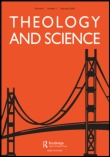
Theology and Science
Unraveling the Mysteries of Faith Through Empirical LensTheology and Science is a leading journal that explores the intricate relationships between theological discourse and scientific inquiry, contributing to the growing dialogue in the fields of Religious Studies, History, and Philosophy of Science. Published by the reputable ROUTLEDGE JOURNALS, TAYLOR & FRANCIS LTD in the United Kingdom, this journal provides a platform for high-quality research, fostering multidisciplinary approaches and addressing the philosophical implications of scientific developments from a theological perspective. With an impressive 2023 impact factor placing it in the Q1 category for Religious Studies and Q2 for both History and Philosophy of Science and Multidisciplinary studies, Theology and Science is positioned to influence academic discourse and shape contemporary understanding. Researchers, professionals, and students alike will find valuable insights and thought-provoking articles that not only advance scholarship but also bridge gaps between these two vital fields of human understanding.
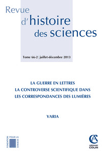
Revue d Histoire des Sciences
Unraveling the Threads of Scientific Thought.Revue d'Histoire des Sciences is a distinguished academic journal published by Armand Colin, focusing on the intricate interplay of history and philosophy within the sciences. Since its inception in 1973, the journal has served as a vital platform for researchers, scholars, and students interested in exploring the historical dimensions of scientific development. With an ISSN of 0151-4105 and an E-ISSN of 1969-6582, this journal is recognized within the academic community, achieving a modest 2023 Scopus ranking of Q3 in History and Philosophy of Science, positioning it within the 41st percentile of its category. The journal offers a prestigious space for rigorous discourse, critical analysis, and innovative research aimed at advancing our understanding of the scientific enterprise's past. While it operates under a traditional access model, the ongoing commitment to rich scholarly content ensures that the contributions will resonate with those dedicated to the intersections of history, science, and philosophy, providing insights into how historical context shapes scientific inquiry and advancement.

ERKENNTNIS
Connecting thinkers through a century of scholarly tradition.ERKENNTNIS, published by SPRINGER, is a premier academic journal that has been advancing the study of philosophy and logic since its inception in 1919. With its esteemed ranking in the Q1 quartile for both categories as of 2023, it stands at the forefront of scholarly discourse, earning an impressive rank of #104 in the field of philosophy and #13 in logic according to the Scopus rankings. This influential publication not only contributes to the theoretical underpinnings of these disciplines but also fosters a vibrant exchange of ideas among researchers, professionals, and students alike. While it does not offer open access to its articles, the journal's esteemed reputation and rigorous peer-review process ensure that all published works maintain the highest standards of quality and intellectual inquiry, making ERKENNTNIS an essential resource for anyone engaged in these critical areas of study.
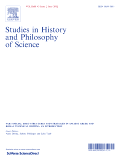
STUDIES IN HISTORY AND PHILOSOPHY OF SCIENCE
Illuminating the Historical Contexts that Shape ScienceSTUDIES IN HISTORY AND PHILOSOPHY OF SCIENCE, published by Elsevier Science Ltd, is a leading academic journal dedicated to the exploration of historical and philosophical dimensions of science. With both an ISSN of 0039-3681 and E-ISSN of 1879-2510, this esteemed journal has established itself as a pivotal resource since its inception in 1970 and continues to publish cutting-edge research reflecting the evolution of scientific thought. Situated in the United Kingdom, it is recognized for its high-impact contributions, boasting a Q1 ranking in both History and History and Philosophy of Science categories as of 2023. Researchers in the humanities will benefit from the journal’s rigorous analysis and insightful discussions, as evidenced by its competitive Scopus rankings—placing it in the 96th and 83rd percentiles in their respective fields. Although not an open-access journal, it maintains a commitment to scholarly excellence, aiming to foster a deeper understanding of the interconnections between historical context and philosophical inquiry in the scientific domain, making it an invaluable resource for students, professionals, and researchers alike.
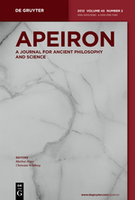
Apeiron-A Journal for Ancient Philosophy and Science
Bridging Timeless Philosophy and Scientific DiscoveryApeiron - A Journal for Ancient Philosophy and Science is a distinguished academic journal published by Walter de Gruyter GmbH, based in Berlin, Germany. As an essential platform for scholars in the fields of History and Philosophy of Science and Philosophy, this journal holds a prestigious Q1 ranking in both domains as of 2023, reflecting its significant impact and contribution to these disciplines. With its ISSN 0003-6390 and E-ISSN 2156-7093, Apeiron aims to foster interdisciplinary dialogue by publishing original research, reviews, and critical essays that explore the rich intersections of ancient thought and scientific inquiry. As the journal converges into its fifth year from 2019 to 2024, it offers a vital resource for researchers, professionals, and students seeking to deepen their understanding of classical philosophical traditions and their relevance to contemporary science. Although it operates under a subscription model, the rigorous peer-review process ensures that each publication maintains the highest academic standards, thus solidifying Apeiron's status as a pivotal resource in its field.